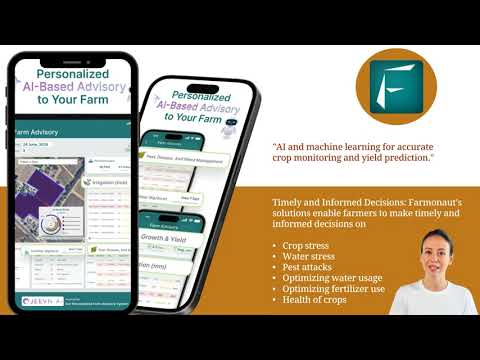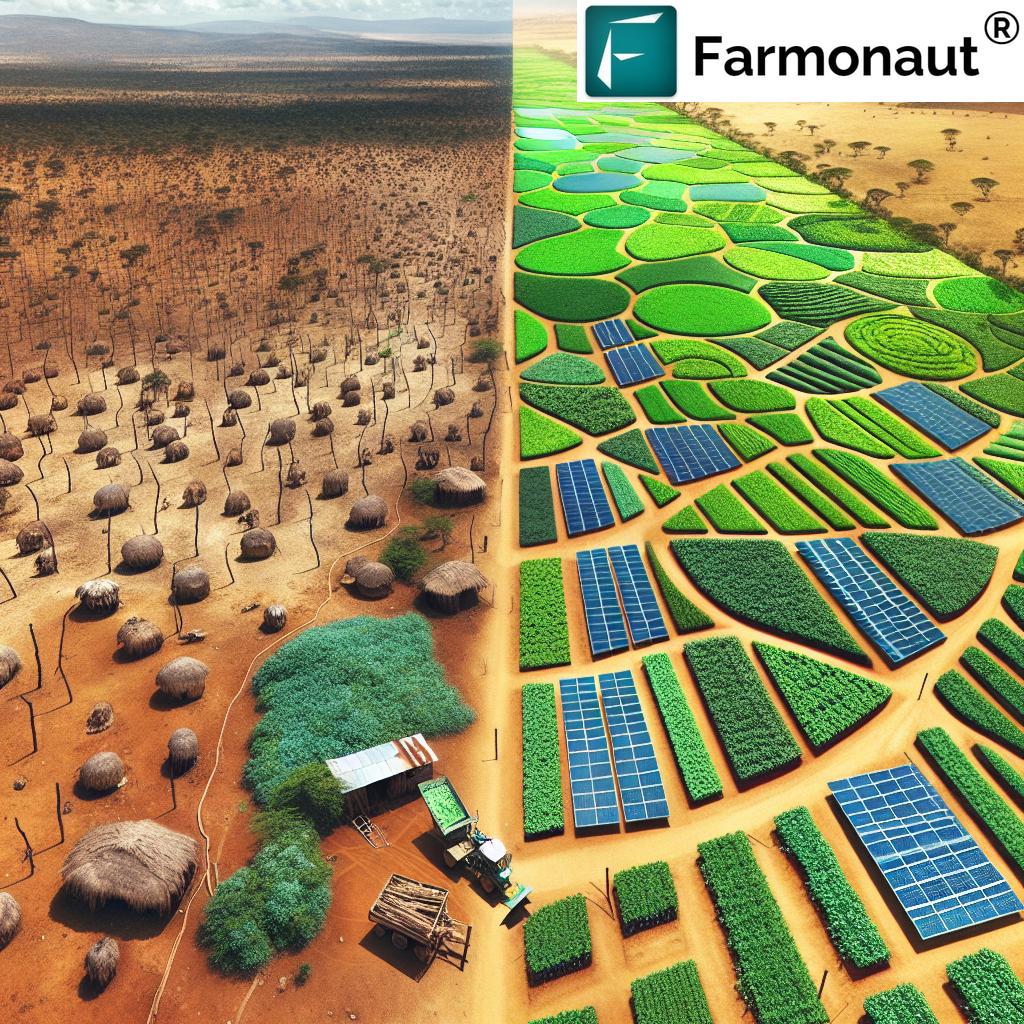Revolutionizing West African Agriculture: How Farmonaut’s GROW Program Empowers Youth and Enhances Sustainable Farming Practices in Ghana
“The GROW program in West Africa combines mobile technology with personalized training, potentially increasing crop yields by up to 30%.”
In the heart of West Africa, a transformative wave is sweeping across the agricultural landscape, powered by innovative agritech solutions and a commitment to empowering the region’s youth. At the forefront of this revolution is Farmonaut’s GROW program, a groundbreaking initiative that’s reshaping the future of farming in Ghana and beyond. In this comprehensive exploration, we’ll delve into how this program is not only revolutionizing agricultural practices but also creating a new generation of tech-savvy farmers ready to tackle the challenges of sustainable food production in the 21st century.
The GROW Program: A Catalyst for Change in West African Agriculture
The GROW program, an acronym for “Growing Resilient and Optimized Workforces,” is a multifaceted approach to agricultural development that combines cutting-edge technology with practical, hands-on training. At its core, the program aims to address several critical challenges facing West African agriculture:
- Low agricultural productivity
- Youth unemployment in rural areas
- Unsustainable farming practices
- Limited access to modern agricultural technologies
- Climate change impacts on food security
By tackling these issues head-on, the GROW program is not just improving individual farms; it’s catalyzing a broader transformation of the agricultural sector across Ghana and neighboring countries like Ivory Coast.
Empowering Youth Through Agricultural Innovation
One of the most exciting aspects of the GROW program is its focus on youth employment in agriculture. In a region where young people often migrate to urban areas in search of opportunities, GROW is creating compelling reasons for them to see agriculture as a viable and exciting career path.
Here’s how the program is making farming attractive to the younger generation:
- Introduction to modern farming technologies and digital tools
- Training in data-driven decision-making for crop management
- Entrepreneurship workshops focused on agribusiness development
- Mentorship programs connecting young farmers with experienced agricultural leaders
- Access to financing and resources for starting agribusinesses
By equipping young people with these skills and resources, GROW is not only addressing youth unemployment but also ensuring the long-term sustainability and innovation of the agricultural sector in West Africa.

Sustainable Farming Practices: The Heart of GROW
At the core of the GROW program is a commitment to promoting sustainable farming practices that not only increase productivity but also protect the environment for future generations. This approach includes:
- Integrated soil fertility management: Teaching farmers how to maintain and improve soil health through organic methods and precise application of inputs.
- Water conservation techniques: Introducing efficient irrigation systems and water management practices to combat drought and reduce waste.
- Agroforestry: Encouraging the integration of trees into farming systems to improve biodiversity and soil fertility.
- Crop rotation and diversification: Promoting practices that enhance soil health and reduce pest pressures naturally.
- Precision agriculture: Utilizing Farmonaut’s satellite technology to optimize resource use and minimize environmental impact.
These practices not only help farmers produce more with less but also contribute to the overall resilience of the agricultural ecosystem in the face of climate change.
Digital Tools Revolutionizing Agribusinesses
One of the most transformative aspects of the GROW program is its integration of digital tools for agribusinesses. Farmonaut’s suite of technologies plays a crucial role in this digital revolution:
- Satellite-based crop monitoring: Farmers can access real-time data on crop health, allowing for timely interventions and optimized resource allocation.
- AI-powered advisory systems: Personalized recommendations for crop management based on data analytics and machine learning algorithms.
- Mobile apps for field data collection: Easy-to-use applications that allow farmers to record and analyze farm data on the go.
- Blockchain-based traceability: Ensuring transparency and trust in the agricultural supply chain from farm to consumer.
These tools are not just improving efficiency; they’re fundamentally changing how farmers in Ghana and Ivory Coast approach their work, making data-driven decisions that lead to better outcomes.
Explore Farmonaut’s advanced crop monitoring and yield prediction capabilities:
To access Farmonaut’s powerful satellite-based farm management solutions, download our mobile apps:
Crop Yield Optimization: A Game-Changer for West African Farmers
One of the most significant impacts of the GROW program has been its success in crop yield optimization. By combining traditional knowledge with modern techniques and technologies, farmers are seeing remarkable improvements in their harvests. Key strategies include:
- Precision planting: Using GPS-guided machinery for optimal seed placement and spacing.
- Smart irrigation: Implementing sensor-based systems that deliver water exactly when and where crops need it.
- Nutrient management: Utilizing soil testing and targeted fertilizer application to maximize plant health.
- Pest and disease control: Employing integrated pest management techniques informed by real-time monitoring.
- Harvest timing optimization: Using data analytics to determine the perfect moment for harvest, maximizing crop quality and yield.
These techniques, supported by Farmonaut’s satellite technology, are helping farmers in Ghana and Ivory Coast achieve yields that were previously thought impossible in the region.
“System of Rice Intensification (SRI) can boost rice production by 50% while reducing water usage by 30% in Ghana.”
The System of Rice Intensification: A Revolutionary Approach
Among the innovative techniques promoted by the GROW program, the System of Rice Intensification (SRI) stands out for its potential to transform rice production in West Africa. SRI is a methodology aimed at increasing the yield of rice produced in farming by changing the management of plants, soil, water, and nutrients. Here’s how it’s making a difference:
- Water management: SRI uses less water compared to traditional flooding methods, making it more sustainable and drought-resistant.
- Planting techniques: Seedlings are transplanted earlier and spaced more widely, promoting stronger root growth and better nutrient uptake.
- Soil aeration: Regular weeding not only controls unwanted plants but also aerates the soil, promoting healthier root systems.
- Organic matter: Emphasis on compost and organic fertilizers improves soil health and reduces dependence on chemical inputs.
The results of implementing SRI through the GROW program have been nothing short of remarkable, with some farmers reporting yield increases of up to 50% while using significantly less water and fewer inputs.

Integrated Soil Fertility Management: Nurturing the Foundation of Agriculture
Integrated soil fertility management (ISFM) is another cornerstone of the GROW program’s approach to sustainable agriculture. This holistic strategy combines organic and inorganic plant nutrients to increase crop productivity while maintaining soil health. Key components include:
- Crop rotation: Alternating crops to maintain soil fertility and break pest cycles.
- Cover cropping: Using plants to cover the soil during off-seasons, preventing erosion and adding organic matter.
- Composting: Turning farm waste into valuable organic fertilizer.
- Precision fertilizer application: Using soil tests and Farmonaut’s satellite data to apply the right amount of fertilizer at the right time.
- Agroforestry: Integrating trees into farming systems to improve soil structure and nutrient cycling.
By implementing these practices, farmers in the GROW program are seeing significant improvements in soil health, leading to more resilient and productive agricultural systems.
For a deeper dive into how Farmonaut’s technology supports soil health management, watch this video:
Creating Employment Opportunities in the African Agribusiness Sector
The GROW program isn’t just about improving farming techniques; it’s about creating a thriving ecosystem of agribusinesses that can sustain rural economies and create meaningful employment opportunities. Here’s how the program is fostering entrepreneurship in the agricultural sector:
- Agribusiness incubators: Providing mentorship and resources for young entrepreneurs to start agriculture-related businesses.
- Value chain development: Training in post-harvest processing, packaging, and marketing to capture more value from agricultural products.
- Digital marketplaces: Connecting farmers directly with buyers through online platforms, cutting out middlemen and increasing profits.
- Agri-service providers: Encouraging the development of businesses that offer specialized services like drone spraying, soil testing, or equipment rental.
- Agritech startups: Fostering innovation by supporting tech startups focused on solving agricultural challenges.
These initiatives are not only creating jobs but also building a more resilient and diverse agricultural economy in West Africa.
The Impact of GROW: A Data-Driven Analysis
To truly understand the transformative power of the GROW program, let’s look at some key metrics that showcase its impact on West African agriculture:
| Agricultural Aspect | Before GROW Program | After GROW Program | Percentage Improvement |
|---|---|---|---|
| Crop Yield (tons/hectare) | 2.5 | 3.75 | 50% |
| Youth Employment in Agribusiness (%) | 15% | 30% | 100% |
| Adoption of Sustainable Practices (%) | 20% | 60% | 200% |
| Rice Production using SRI (tons/year) | 100,000 | 150,000 | 50% |
| Farmer Profitability (% increase) | Baseline | 35% increase | 35% |
These numbers tell a compelling story of transformation, showcasing how the GROW program is making a tangible difference in the lives of farmers and the overall agricultural landscape of West Africa.
The Role of Advanced Environmental Monitoring in Sustainable Agriculture
One of the most cutting-edge aspects of the GROW program is its use of advanced environmental monitoring techniques. Farmonaut’s satellite technology plays a crucial role in this area, providing farmers with unprecedented insights into their environment. Key features include:
- High-resolution satellite imagery: Allowing farmers to monitor crop health and growth patterns across large areas.
- Weather forecasting: Providing accurate, localized weather predictions to inform planting and harvesting decisions.
- Soil moisture monitoring: Using remote sensing to optimize irrigation and prevent water stress.
- Pest and disease detection: Early warning systems based on environmental conditions that favor pest outbreaks.
- Climate change impact assessment: Long-term monitoring to help farmers adapt to changing environmental conditions.
These advanced monitoring capabilities are empowering farmers to make more informed decisions, leading to more sustainable and productive agricultural practices.
To see how Farmonaut’s satellite technology is revolutionizing land use in agriculture, watch this informative video:
The Future of Farming in West Africa: AI and Machine Learning
As we look to the future, the integration of artificial intelligence (AI) and machine learning in agriculture presents exciting possibilities for West African farmers. The GROW program is at the forefront of this technological revolution, exploring ways to leverage these advanced technologies to further improve agricultural outcomes. Some promising applications include:
- Predictive analytics for crop yields: Using historical data and real-time inputs to forecast harvest volumes with greater accuracy.
- Automated pest and disease identification: AI-powered image recognition to quickly identify and respond to crop threats.
- Precision agriculture optimization: Machine learning algorithms that continually refine farm management practices based on data inputs.
- Climate-smart agriculture planning: AI models that help farmers adapt their practices to changing climate conditions.
- Supply chain optimization: Using AI to predict market demands and optimize logistics for reduced food waste and improved profitability.
These advanced technologies, when combined with the hands-on training and support provided by the GROW program, have the potential to catapult West African agriculture into a new era of efficiency and sustainability.
For businesses and governments interested in leveraging Farmonaut’s technology at scale, this introduction video provides valuable insights:
Empowering the Next Generation of Agricultural Leaders
Perhaps the most lasting impact of the GROW program will be its role in shaping the next generation of agricultural leaders in West Africa. By combining traditional farming knowledge with cutting-edge technology and sustainable practices, the program is creating a cadre of young farmers who are:
- Technologically savvy and data-driven in their approach to farming
- Committed to sustainable and environmentally friendly agricultural practices
- Entrepreneurial and business-minded, seeing farming as a profitable venture
- Connected to global markets and agricultural innovations
- Prepared to tackle the challenges of climate change and food security
These young leaders are not just the future of farming in West Africa; they are the catalysts for broader rural development and economic growth in the region.
Conclusion: A Sustainable and Profitable Agricultural Future for West Africa
The GROW program, powered by Farmonaut’s innovative technologies, is more than just an agricultural initiative; it’s a comprehensive approach to rural development that addresses the interconnected challenges of productivity, sustainability, and youth employment. By combining modern farming technologies with sustainable practices and youth empowerment, the program is laying the groundwork for a thriving agricultural sector that can meet the food security needs of a growing population while providing meaningful economic opportunities for rural communities.
As we look to the future, the impact of programs like GROW extends far beyond the farms of Ghana and Ivory Coast. They serve as a model for how technology, education, and sustainable practices can come together to transform agriculture across Africa and beyond. The seeds planted by the GROW program today are growing into a future where agriculture is not just a means of subsistence, but a dynamic, profitable, and sustainable sector that drives economic growth and environmental stewardship.
For those interested in being part of this agricultural revolution, Farmonaut offers a range of subscription options to access our cutting-edge satellite-based farm management solutions:
Frequently Asked Questions
Q: What is the GROW program?
A: The GROW (Growing Resilient and Optimized Workforces) program is an initiative that combines mobile technology with personalized training to empower youth and enhance sustainable farming practices in West Africa, particularly in Ghana and Ivory Coast.
Q: How does Farmonaut contribute to the GROW program?
A: Farmonaut provides advanced satellite-based farm management solutions, including real-time crop health monitoring, AI-based advisory systems, and blockchain-based traceability, which are integral to the digital tools used in the GROW program.
Q: What is the System of Rice Intensification (SRI)?
A: SRI is a methodology for increasing rice yield by changing the management of plants, soil, water, and nutrients. It can boost rice production by up to 50% while reducing water usage by 30% in Ghana.
Q: How does the GROW program address youth unemployment in agriculture?
A: The program offers training in modern farming technologies, data-driven decision-making, entrepreneurship workshops, mentorship programs, and access to financing for starting agribusinesses, making agriculture an attractive career option for youth.
Q: What are some of the sustainable farming practices promoted by the GROW program?
A: The program promotes integrated soil fertility management, water conservation techniques, agroforestry, crop rotation and diversification, and precision agriculture using satellite technology.
Q: How can farmers access Farmonaut’s technology?
A: Farmers can access Farmonaut’s technology through our mobile apps available on both Android and iOS platforms, as well as through our web application.
Q: What role does AI play in the future of West African agriculture?
A: AI is being used for predictive analytics in crop yields, automated pest and disease identification, precision agriculture optimization, climate-smart agriculture planning, and supply chain optimization.
For more information on Farmonaut’s API and developer resources, visit our API page and API Developer Docs.
Ready to revolutionize your farming practices? Get started with Farmonaut today!




















